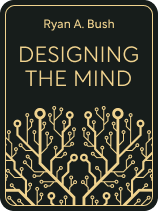

This article is an excerpt from the Shortform book guide to "Designing the Mind" by Designing the Mind and Ryan A Bush. Shortform has the world's best summaries and analyses of books you should be reading.
Like this article? Sign up for a free trial here.
What are value-based goals? How do you connect your goals and values?
According to Ryan A. Bush, the author of Designing the Mind, your goals should be informed by your values. Pursuing value-based goals (instead of desire-based goals) will bring you fulfillment and success.
Keep reading to learn how to set value-based goals, according to Bush.
Base Goals On Your Values
Before we explain how to set value-based goals, let’s explore what values actually are. Values start as your intuitions about the perceived “goodness” and “badness” of different actions and consequences. When you have the same intuitions about what’s good and bad over and over, you get a sense of your ideal traits, such as kindness, courage, or honesty. The collection of these ideals becomes your value system, which represents your ideal self and the traits you want to embody. Embodying your values
(Shortform note: In The Success Principles, Jack Canfield expands on the idea of using goals to shape your behavior, arguing that you should act as if you’ve already achieved your goals. This will help you attract and recognize opportunities and people that will bring you closer to completing them. To determine how specifically you should act, ask yourself the following questions: How would you feel when you achieve your goals? How would you think? How would you talk? What would you wear? Additionally, try modeling the behaviors of successful people, like self-confidence and comfort with taking risks.)
| How to Define Your Values When You Struggle to Intuit Them Discovering your values might be hard if you’re not in touch with your intuition. If you’re in this situation but you still want to gain the benefits of clarifying your values (increased success and fulfillment), you’ll first need to take extra action to identify your values consciously. Start by reviewing a list of core values—like wisdom, loyalty, and kindness—and write down the ones that resonate with you. Additionally, think about the people you admire most and the qualities they represent, and write down these qualities too. For example, you might admire a family member for their generosity. Once you have a list of values you feel represent you, group them into categories. For instance, if you wrote down kindness, generosity, and empathy, you might make a group of values centered around helping others. These groups can help you identify major themes in your value system and figure out what matters most to you. |
Values vs. Desires
Bush warns that values shouldn’t be confused with desires. Desires represent the things we want and crave—like a fancy new phone or expensive concert tickets—but they aren’t necessarily the things that will make us happy. Often, when we acquire the object of our desire, it doesn’t make us feel as good as we thought it would, leaving us unsatisfied. Desires also invite loss into our lives—we feel good when we obtain something we want, but we suffer when we inevitably lose it since everything’s impermanent.
(Shortform note: As Bush states, greater desire often invites greater dissatisfaction. Unfortunately, our modern consumer culture depends on us desiring things. Every year, companies spend billions of dollars on advertising that entices us to spend more on items we desire. Then, we desire more money to keep spending, and our dissatisfaction increases. Research shows that people in countries with greater wealth—and thus a more robust consumer culture—are often unhappier than people in poorer countries. To break the cycle of consumerism and desire, focus on appreciating and taking care of what you already have. Additionally, look to the truly important things for fulfillment, like the people you love or activities you enjoy.)
Even though they rarely contribute to our long-term happiness, Bush notes, desires are often more powerful than values. Our brains are designed to follow desires without question—the feel-good chemical dopamine (which is tied to desire) pushes us toward action with the promise that we’ll receive a reward once we get what we want. In contrast, values are steady and ever-present, but they’re also easier to ignore.
| How to Reduce Your Dependence on Instant Gratification Desires are more powerful than values because fulfilling them brings an immediate reward—dopamine—and we’re hardwired to seek instant gratification. It’s much harder for us to conceptualize and make decisions based on an intangible future reward, which is what following our values brings. That being said, delaying gratification is a skill we can practice and learn. One strategy for doing so is using commitment devices, or circumstances that you set up to remove temptation. For example, say you want to spend more time reading because you value having a wide breadth of knowledge. Still, you’re struggling to achieve your goal because you often pick up your phone and spend hours scrolling through social media instead of reading, since it gives you an instant hit of dopamine. To help you commit to your values-based reading goal, consider putting your phone in another room while you read or deleting the social media app from your phone. |
How to Set Values-Based Goals
Bush describes a values-oriented framework you can use to align your goals and values. As representatives of your ideal self, your values should be at the top of your goal framework, meaning that your goals should always bring you closer to them in some way. Then, use reason and logic to determine the best methods for achieving those goals. Finally, let your desires drive you to take action toward your goals.
For example, say you strongly value independence. To become closer to your ideal self as an independent person, you make a lofty, value-driven goal to be your own boss someday. Instead of quitting your job right away, though, you use logic to make a plan that will allow you to save enough money to open a business of your own. Finally, you allow your desires—like wanting comfort and security, wanting a flexible schedule, and so on—to push you to take the steps necessary to make the plan a success.
(Shortform note: Keeping your goals centered on your values first before logic and desires works well because it helps you focus not only on what you want but why you want it. In other words, values-based goals give you purpose, direction, and motivation since they align so closely with what you truly want and who you truly are. This means that, in addition to helping you achieve self-mastery, values-based goals might actually make you healthier—recent studies show that a sense of purpose can have important health benefits. Having a strong sense of purpose can counteract the effects of chronic stress and protect the body against inflammation. Additionally, high levels of purpose reduce activity in the amygdala, making you less emotionally reactive.)

———End of Preview———
Like what you just read? Read the rest of the world's best book summary and analysis of Designing the Mind and Ryan A Bush's "Designing the Mind" at Shortform.
Here's what you'll find in our full Designing the Mind summary:
- How the mind can be reprogrammed like a computer
- Strategies to help you change negative thought patterns, emotions, and behaviors
- How to eliminate your biases to perceive reality more accurately






